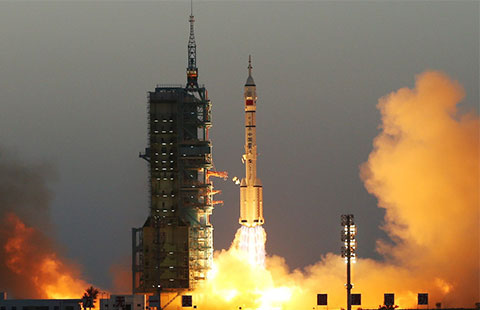China launches longest-ever manned space mission
[2016-10-17 17:53]China on Monday successfully launched manned spacecraft Shenzhou-11 carrying two astronauts who will remain in space for 33 days, the longest mission in the country's manned space program to date.
China closer to establishing permanent space station with launch of Shenzhou-11
[2016-10-17 17:42]The launch of a new manned space mission brings China closer to the establishment of a permanent space station, international experts say.
China launches manned spacecraft
[2016-10-17 07:43]Spacecraft Shenzhou XI blasts off from Northwest China with two astronauts who will spend 30 days aboard the Tiangong II space laboratory.
China to launch Shenzhou-11 manned spacecraft on Oct 17
[2016-10-16 09:27]The Shenzhou-11 manned spacecraft will be launched at 7:30 am Monday Beijing Time, China's manned space program spokesperson said.
China may have sole space station
[2016-10-08 07:50]China may be the only country to have a space station in service in 2024, said Lei Fanpei, chairman of China Aerospace Science and Technology Corp.
Tiangong-2 space lab enters preset orbit for docking with manned spacecraft
[2016-09-26 07:52]Chinese scientists on Sunday maneuvered the country's Tiangong-2 space lab to a preset orbit 393 kilometers above Earth's surface, in preparation for a planned docking with the Shenzhou-11 manned spacecraft set to launch next month.
Scientific experiment apparatus on Tiangong-2 put into operation
[2016-09-24 12:37]Scientific apparatus carried by Tiangong-2 began operational at around 6:41 pm Thursday Beijing Time after being on standby mode for nearly seven days since the space lab entered its preset orbit on Sept 15.
Space lab begins tests in orbit, prepares for visit by astronauts
[2016-09-23 10:18]China's second space laboratory, the Tiangong II, began conducting in-orbit tests on Thursday, according to the Chinese Academy of Sciences.
Astronauts given comfort upgrade on China's new space lab
[2016-09-17 06:45]China's newest space laboratory, Tiangong II, will provide more comfortable digs to astronauts living aboard than its predecessor, Tiangong I, the spacecraft's designers said.
China's space lab Tiangong-2 enters in-orbit test track
[2016-09-16 21:02]China's space lab Tiangong-2 has entered an in-orbit test track, the Beijing Aerospace Control Center said Friday.
Tiangong-2 takes China one step closer to space station
[2016-09-16 09:56]China's Tiangong-2 space lab blasted off on Thursday, marking another milestone in its increasingly ambitious space program, which envisions a mission to Mars by the end of this decade and its own space station by around 2020.
2nd space lab on its way to key mission
[2016-09-16 09:20]China launched its second space laboratory, the Tiangong II, on Thursday night, which space officials said will become the country's largest scientific platform in space.



